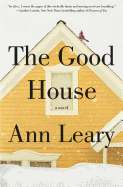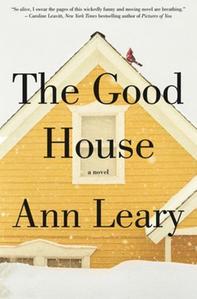
 Ann Leary knows well the worlds of the wealthy and of small towns north of Boston (she lived in Marblehead during her high school years). Her second novel, The Good House, is set in Wendover, a coastal town where real estate has replaced lobstering as the biggest business and new McMansions are zoned to be quaint. Leary tells her story through Hildy Good, a successful real estate broker privy to all that goes on behind the wrought iron gates and faux gables. She is delightfully frank: "I know everything that happens in this town," she says. "I'm an old townie; the eighth-great-granddaughter of Sarah Good, one of the accused witches tried and hanged in Salem.... I live alone; my daughters are grown and my husband is no longer my husband. I talk to animals."
Ann Leary knows well the worlds of the wealthy and of small towns north of Boston (she lived in Marblehead during her high school years). Her second novel, The Good House, is set in Wendover, a coastal town where real estate has replaced lobstering as the biggest business and new McMansions are zoned to be quaint. Leary tells her story through Hildy Good, a successful real estate broker privy to all that goes on behind the wrought iron gates and faux gables. She is delightfully frank: "I know everything that happens in this town," she says. "I'm an old townie; the eighth-great-granddaughter of Sarah Good, one of the accused witches tried and hanged in Salem.... I live alone; my daughters are grown and my husband is no longer my husband. I talk to animals."
Hildy has her own secrets: the recession has hurt her business, and firms like Sotheby's are moving on to her turf. Her daughters are in and out of therapy and financially dependent on her, but not so dependent that they don't orchestrate an "intervention" and withhold access to her beloved grandchild unless she spends a month at Hazelden to address her alcoholism. After 20 years of marriage and fatherhood, her ex-husband finally accepted his homosexuality, only to be abandoned by his romantic partner. Her childhood friend, the town's only psychiatrist, is having an affair with a wealthy horsewoman and former patient who has become madly obsessive and threatens his exposure to the licensing board. Is it any wonder that Hildy still drinks--secretly, in her mouse-infested cellar, so that her daughters don't find out? As her surreptitious, lonely drinking grows out of control, another childhood friend, Frankie--the town's garbage man, handyman and snow removal tycoon--takes her under his wing with a love and tolerance she has never quite experienced before.
When we think of literature arising from small New England towns, we might imagine the spare simplicity of Thornton Wilder's Grover's Corners or Richard Russo's economically destitute mill town of Empire Falls. In Ann Leary's able hands, the modern New England town of today can be found just north of Boston. It's the voice of Hildy, though, that makes Leary's new novel work so well. Her irreverent observations and sharp chatterbox tongue are balanced by a vulnerability that makes her the perfect ironic but all too human commentator on a world too much like it really is. --Bruce Jacobs
Shelf Talker: Hildy Good, the narrator of Leary's second novel, is a fresh and vulnerable observer as the rich take over the simple traditional world of her New England coastal town.

